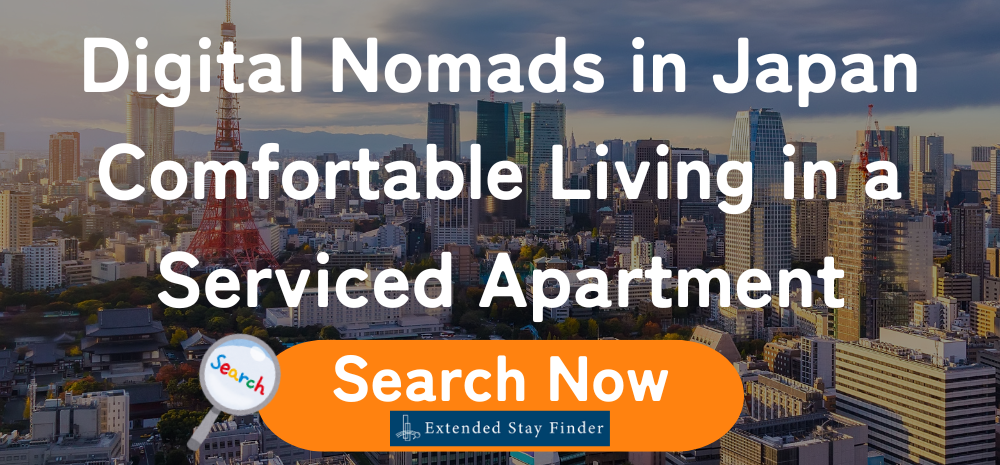- HOME
- News & Column
- How to Find Digital Nomads Housing in Japan
How to Find Digital Nomads Housing in Japan
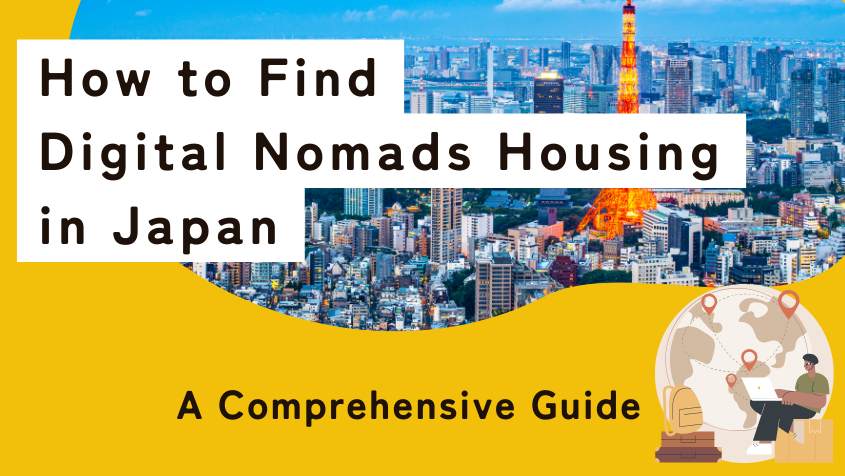
A digital nomad refers to a lifestyle that allows individuals to work without being constrained by location or time.
Japan is a fascinating country where advanced technology coexists with traditional culture. Starting from April 1, 2024, the Digital Nomad Visa program has been introduced, making it an ideal place for digital nomads to live.
In this article, we will comprehensively introduce how to find housing for living as a digital nomad in Japan, the newly introduced visa system, and the attractions of living as a digital nomad in Japan.
Types of Housing Suitable for Digital Nomads in Japan
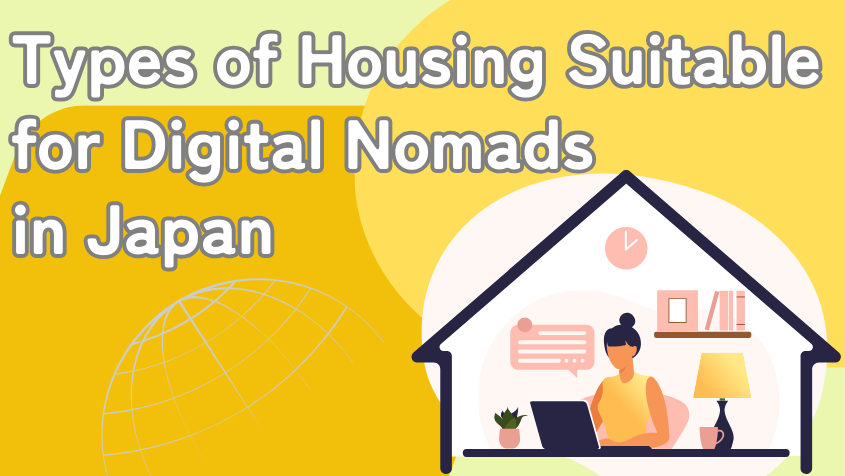
For digital nomads, housing is crucial for maintaining a balance between work and life.
Japan offers a variety of housing options, each with its own distinct advantages. Here, we will introduce four types of housing suitable for digital nomads in Japan.
Serviced Apartment
A Serviced Apartment is a hybrid housing facility between a hotel and an apartment, which is highly appealing to digital nomads.
It comes fully furnished with appliances, kitchenware, and offers services similar to a hotel while providing the residential feel of an apartment.
For example, many Serviced Apartments often include room cleaning and linen replacement services, which significantly reduce daily household chores.
They typically offer amenities such as 24-hour front desk support and security, providing a secure and comfortable living environment.
Additionally, many Serviced Apartments often include Wi-Fi and utilities (electricity, heating, etc.) in the rent, which eliminates the hassle of setting up internet contracts or paying utility bills.
This allows digital nomads to start living and working without stress right after arrival.
Furthermore, Serviced Apartments are typically located in business districts or areas with convenient transportation, making them ideal for both outings and remote work.
Many also feature amenities such as fitness gyms, pools, and restaurants, allowing residents to maintain a work-life balance and enjoy a rich lifestyle.
While it varies by property, Serviced Apartments typically accommodate short to medium-term stays, offering flexibility in duration that aligns well with various schedules.
This flexibility allows digital nomads to use them according to their needs, making Serviced Apartments an ideal choice that supports both comfortable living and work-life balance for digital nomads.
If you are a digital nomad in Japan and considering a Serviced Apartment for your housing, please use「Extended Stay Finder」
Image source:Extended Stay Finder
Extended Stay Finder, as a pioneer in introducing serviced apartments in Japan, has provided services to approximately 100,000 people to date.
Utilizing extensive information and a unique network, Extended Stay Finder supports finding the ideal accommodation tailored to customer needs, whether for long-term or short-term stays.
Hotel suitable for long-term stays
Long-stay hotels, unlike regular hotels, offer specialized services and amenities tailored for long-term residents.
They typically include utilities such as electricity and Wi-Fi in the rent, eliminating the hassle of contract procedures.
Additionally, they provide cleaning services, similar to Serviced Apartments, making them convenient for extended stays.
However, compared to Serviced Apartments, long-stay hotels have some drawbacks.
Firstly, long-stay hotels tend to have slightly restricted privacy. Many hotels have frequent interactions with other guests and hotel staff, making it challenging to maintain a private space.
In contrast, Serviced Apartments typically offer complete privacy with independent units where residents can enjoy their lifestyle at their own pace.
Furthermore, while rooms in long-stay hotels typically meet basic living needs, they may find it challenging to accommodate individual requests or customization.
In contrast, Serviced Apartments can often provide flexible solutions tailored to residents’ specific needs, offering environments that better fit individual lifestyles.
Weekly apartment / Monthly apartment
Weekly apartments or monthly apartments are convenient and flexible housing that allow for short-term contracts, typically by the week or month.
Weekly apartments or monthly apartments are typically more straightforward in terms of procedures compared to regular rental housing.
They come furnished with furniture and appliances, allowing you to start living immediately after moving in. This flexibility makes them attractive for short-term stays, enabling a comfortable lifestyle without the burden of extensive setup.
However, weekly or monthly apartments come with some constraints.
Firstly, compared to regular rental housing, they tend to have higher rents. Even for short-term stays, the convenience and level of service provided are reflected in the price, so it’s important to consider cost-effectiveness carefully.
Furthermore, weekly or monthly apartments often have limited kitchen facilities and storage space, which may pose constraints for cooking or long-term living.
Thus, while these apartments offer flexible housing suitable for short-term stays, they may not be ideal for extended periods. It’s essential to choose based on your own lifestyle and the duration of your stay.
Airbnb
Airbnb provides digital nomads with unique and flexible housing options.
Unlike traditional hotels or apartments, Airbnb allows you to rent individual homes, apartments, or even entire houses owned by individuals, offering a diverse range of stay experiences.
Airbnb accommodates stays ranging from short-term to long-term, and booking procedures are easily done online.
The platform offers a wide variety of accommodation options, allowing you to choose properties that fit your budget and preferences, which is a significant appeal for many users.
Airbnb properties come fully furnished with furniture and appliances.
Each property may have its own unique design and location, offering the opportunity to experience local culture and lifestyle. Many properties also include amenities such as kitchens and washing machines, making them comfortable for long-term stays as well.
However, there are some considerations with Airbnb.
Firstly, the quality of properties and the responsiveness of hosts can vary, so it’s important to check reviews beforehand. Additionally, guests need to adhere to Airbnb’s rules and the specific rules set by hosts.
Unlike hotels or Serviced Apartments, Airbnb typically does not offer 24/7 support, which is something to keep in mind.
As such, while Airbnb offers unique stay experiences, it requires attention to factors such as property selection, costs, and communication with hosts.
Shared House
Shared house allows multiple residents to split rent and utility costs, making it affordable to live comfortably.
Additionally, these housings come fully furnished with furniture and appliances, enabling residents to start living immediately upon moving in, which is a significant advantage.
In a Shared house, there are common areas such as kitchens, living rooms, and bathrooms provided for shared use among residents.
This setup allows residents to maintain privacy in their individual rooms while also enjoying interaction with other residents in the communal areas.
For instance, through communication among residents, valuable information exchange about local living tips, remote work strategies, and more is possible in a Shared house.
Moreover, since many Shared houses accommodate a diverse community including foreigners, there are abundant opportunities for cultural exchange and interaction.
On the other hand, living in a Shared house requires coordination among residents regarding the use of common spaces and adherence to cleaning rules, which could lead to potential conflicts or issues.
It’s important to exercise caution in this regard.
Particularly due to differences in lifestyle rhythms and values, there may be situations where residents experience stress.
Furthermore, due to limitations in the size of individual rooms and ensuring privacy, Shared houses may not be suitable if you require a completely quiet environment.
While Shared houses offer economical living and opportunities for social interaction, it’s essential to consider the rules for using shared spaces and potential privacy concerns.
The criteria for housing suitable for digital nomads

Finding the right housing is a crucial factor in enhancing both the quality of work and life for digital nomads. In this section, we will explain what makes a housing suitable for digital nomads.
Internet infrastructure
One of the most important criteria for digital nomads when choosing housing is having a reliable internet connection.
Specifically, a stable and high-speed internet connection is essential.
Although Japan is one of the countries with the most advanced internet infrastructure in the world, the speed and stability of the connection can vary depending on the region and building. Therefore, it is important to check this in advance.
Additionally, a stable power supply is also necessary.
This is particularly important in older buildings, where power outages or voltage instability can be issues, so it is crucial to pay attention to this as well.
Comfortable workspaces
For digital nomads, having a comfortable workspace greatly impacts productivity and the quality of work.
Firstly, a spacious desk and a chair that is comfortable for long periods are essential for efficiently spreading out a computer and documents to work effectively.
Additionally, having enough power outlets and USB ports in the workspace to use all necessary devices simultaneously is important.
Moreover, a quiet environment is a significant advantage, as it reduces stress from noise and helps maintain concentration for productive work.
When the layout and facilities are tailored to an individual’s work style, digital nomads can work more comfortably and effectively.
Motivation can be maintained
For digital nomads, an environment that helps maintain motivation is directly linked to work outcomes.
Firstly, having a space to relax is important for promoting mental and physical refreshment during breaks, which in turn enhances concentration and focus on work.
For example, having a balcony or terrace where you can take breaks outdoors can be refreshing and provide a change of scenery.
Additionally, having accessible places or tools for quick refreshment when you hit a roadblock in your work makes it easier to switch gears and contributes to maintaining motivation.
For digital nomads, establishing a clear boundary between work and private life and creating an environment that facilitates easy transitions between relaxation and concentration is essential for leading a balanced life.
Having such an environment in place allows them to maintain high motivation and achieve sustained productivity over time.
Life can begin immediately
For digital nomads, having a ready-to-start living environment is a crucial factor. This ideally includes housing that is furnished and equipped with necessary appliances.
This means upon arrival, there’s no need for the hassle of assembling furniture or purchasing household items, allowing them to immediately dive into daily life and work.
Having essential furniture such as a bed, sofa, desk, and chair, along with appliances like a refrigerator, washing machine, and microwave, is extremely convenient for digital nomads.
Additionally, having the internet already set up without the need for contract procedures is essential for starting remote work immediately.
In addition, having supermarkets, convenience stores, and restaurants nearby is beneficial for digital nomads. This makes it easy to purchase groceries and daily necessities, facilitating a smooth transition into daily life.
A location with good access to public transportation also enhances convenience for outings and exploring the area.
By choosing housing that is equipped with all necessary facilities and amenities, such as those mentioned, digital nomads can significantly reduce the stress of moving and starting a new life.
This ensures they can swiftly and comfortably begin their digital nomad lifestyle with ease.
Advantages of Being a Digital Nomads and Finding Housing in Japan
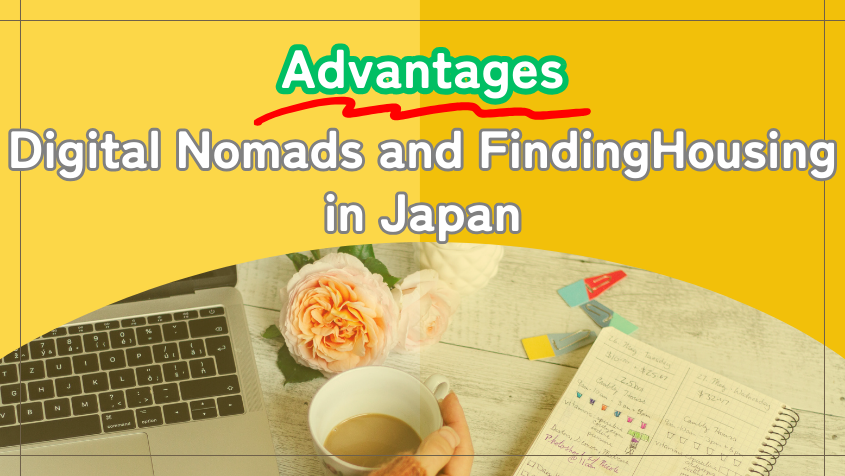
Digital nomads can live and work anywhere in the world while reaping different advantages depending on the country they choose to relocate to.
Here, we will explain the advantages of being a digital nomad (finding housing) in Japan.
A safe and clean living environment
Japan offers a globally recognized safe and clean living environment with low crime rates, allowing residents to live comfortably and securely.
Particularly, a significant advantage is the high level of safety not only in urban areas but also in regional cities and tourist destinations.
Moreover, Japan’s public transportation system is highly reliable, with minimal traffic accidents and issues, providing a sense of security when traveling.
The cleanliness standards are also notably high, with cities and public facilities well-maintained and a strong commitment to waste separation and recycling practices.
Regarding housing, residences in Japan typically maintain high standards of cleanliness and management, allowing residents to live comfortably.
Additionally, food safety is a priority, ensuring the quality of ingredients and dishes available at supermarkets and convenience stores. This contributes to maintaining a healthy dietary lifestyle more easily.
Furthermore, Japan’s unique culture of hospitality, known as “Omotenashi,” contributes to a comfortable living environment.
Staff at stores and facilities are known for their kindness and attentive service, providing helpful assistance when needed.
Advanced technological infrastructure
Japan provides an ideal environment for digital nomads as a country equipped with advanced technological infrastructure.
In particular, the internet connectivity infrastructure is well-developed, offering high-speed and stable internet access nationwide.
Whether in urban areas or rural regions, high-speed internet via fiber optics is widely available, ensuring comfortable execution of online meetings and seamless data transmission essential for remote work.
Furthermore, Japan boasts a well-developed infrastructure for mobile phones and mobile data.
Major carriers provide extensive 4G and 5G networks, allowing digital nomads to stay connected to the internet using mobile hotspots even while on the go or traveling.
This enables flexibility in continuing work seamlessly regardless of location.
Additionally, free Wi-Fi is often provided in major public spaces, cafes, and even on public transportation in Japan.
This widespread availability of Wi-Fi allows for easy access to the internet in various locations, further facilitating connectivity for digital nomads.
Places suitable for remote work
Japan offers a wealth of locations suitable for remote work, with environments that cater to diverse working styles.
Particularly in major cities, there are numerous coworking spaces and shared offices that support flexible working arrangements tailored to individual needs.
These facilities typically provide high-speed Wi-Fi, private meeting rooms, and café spaces, ensuring that all the necessary infrastructure for remote work is in place.
This setup allows individuals to work efficiently in a relaxed environment conducive to concentration.
In addition, cafes and restaurants are increasingly providing environments conducive to remote work. Many cafes offer free Wi-Fi and power outlets, creating a relaxed atmosphere where people can work comfortably.
Furthermore, in Japan, even in natural resort areas and tourist destinations, remote work environments are being developed. Options for remote work include hot spring resorts, seaside resorts, and quiet housing in mountainous areas, where people can work remotely.
The concept of “workation,” working in a natural environment, has become popular.
This allows individuals to enhance both work and personal life. Particularly, these locations offer an escape from the hustle and bustle of the city, enabling individuals to refresh themselves while increasing productivity.
Therefore, they are highly favored by many digital nomads.
Diverse cultural experiences
Japan offers a fascinating experience for digital nomads to enjoy diverse cultural experiences.
You can experience a unique lifestyle woven from a blend of history and modernity, distinctive customs and traditions, and rich natural surroundings.
For example, in ancient cities like Kyoto and Nara, you have the opportunity to explore ancient temples and shrines, and learn about traditional tea ceremony and flower arrangement cultures.
In major cities like Tokyo and Osaka, you can immerse yourself in cutting-edge fashion, technology, and entertainment scenes.
Furthermore, in Japan, you can enjoy seasonal attractions throughout the year.
The beauty of cherry blossoms in spring, autumn foliage in fall, and winter snowscapes captivate many with their seasonal charm.
You can participate in seasonal events and traditional festivals, experiencing the changing seasons deeply while immersing yourself in Japanese culture.
Food culture
Japan boasts a rich food culture where you can enjoy a wide variety of flavors.
From traditional Japanese cuisine that emphasizes fresh ingredients, to convenient street food options, and diverse international dishes catering to vegan and vegetarian preferences, Japan offers a plethora of culinary experiences to savor.
Japan offers a wide array of culinary delights, such as sushi, sashimi, tempura, udon, ramen, and more, all readily available in everyday life.
Additionally, you can enjoy seasonal dishes that highlight ingredients specific to each season, as well as regional specialties that reflect local flavors.
This diversity allows for a rich and varied culinary experience across Japan.
In Japan, every city boasts well-stocked convenience stores and supermarkets where you can easily procure balanced meals.
Moreover, the dining-out culture is well-developed, offering a wide range of options from fast food to high-end restaurants, catering to various budget ranges.
Furthermore, Japan’s café culture is not to be missed. Stylish cafes and specialty shops offer not only exquisite coffee and sweets but also many places equipped with Wi-Fi, making them suitable as hubs for remote work.
Particularly in urban areas, cafes are abundant and scattered, allowing you to choose a spot based on your mood and the nature of your work.
In addition, Japan’s food culture is deeply rooted in the spirit of “Omotenashi,” or hospitality, and the quality of service and cuisine offered at restaurants is held to high standards.
Enjoying the distinct characteristics and services of each establishment is also a highlight of experiencing Japan’s culinary culture.
Disadvantages of Being a Digital Nomads and Finding Housing in Japan
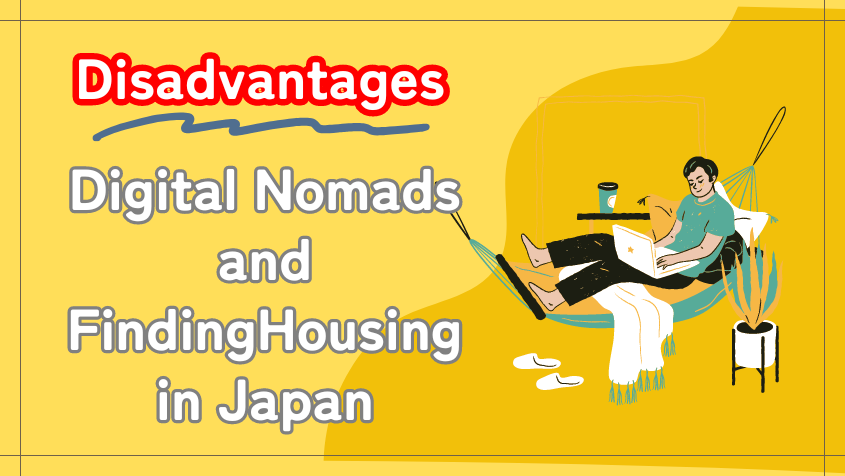
Japan is an attractive place for digital nomads; however, there are also disadvantages to consider during your stay. Here, we will explain the disadvantages of living as a digital nomad in Japan.
Language barrier
When living as a digital nomad in Japan, the language barrier is a significant challenge.
In Japan, daily life, administrative procedures, healthcare facilities, and many other situations require proficiency in Japanese.
Especially for important matters such as rental contracts, utility payments, and government procedures, not understanding Japanese can hinder smooth progress.
There are increasing locations with English-speaking staff, but in rural areas, their number is limited, making communication challenging without proficiency in the language.
Additionally, if you cannot read or write Japanese, you might struggle with daily information gathering, such as reading signs, menus, and public transportation guides.
This challenge is especially significant with official notifications from government offices or contractual documents, which often contain specialized terminology, making them difficult to understand and potentially leading to misunderstandings or mistakes.
Furthermore, adapting to Japanese culture and business etiquette can be challenging, especially when combined with the language barrier.
For example, getting accustomed to the unique Japanese communication style, which emphasizes polite language, honorifics, and consideration for others, can take time.
In recent years, there have been convenient tools such as multilingual AI chatbots, portable translation devices, and translation apps available on smartphones, which have made communication smoother.
However, learning common Japanese phrases that you use frequently can still be very useful.
As such, the language barrier presents a significant challenge in living in Japan, but there are ways to overcome it through appropriate measures and learning.
Particularly, acquiring basic Japanese language skills can greatly enhance your quality of life.
Living expenses
Living expenses are a significant challenge when living in Japan as a digital nomad, especially in major cities where costs for rent, food, transportation, and other expenses tend to be high.
Regarding food expenses, Japan’s developed dining-out culture can lead to increased costs. Whether dining at izakayas, restaurants, or purchasing from convenience stores, daily expenses can add up unexpectedly.
However, prices vary depending on the region and establishment, so careful shopping can help save money.
On the other hand, in regional cities and suburban areas, living expenses can be relatively lower. Rent tends to be more affordable, and prices for daily necessities and groceries may be cheaper compared to urban areas.
Additionally, by utilizing local specialties and markets, it’s possible to obtain fresh ingredients while keeping food costs down.
Indeed, while the high cost of living poses a challenge, it’s possible to manage costs to some extent through careful budget planning and lifestyle adjustments.
Visa restrictions
When living in Japan as a digital nomad, visa restrictions pose a significant hurdle.
Tourist visas or short-term stay visas typically allow stays of around 90 days, and working beyond this period while residing long-term can be challenging.
As of April 2024, Japan has introduced a new digital nomad visa, but obtaining it comes with stringent requirements such as annual income criteria.
Regardless, applying for the visa involves various documents and procedures, which can be time-consuming and require effort.
When applying for a visa, necessary documents typically include proof of occupation, income, residential address in Japan, and purpose of stay. To prepare these, coordination with agencies both in Japan and abroad is necessary.
Additionally, when renewing or changing a visa, compliance with specified procedures and requirements is essential, as delays can occur if not fulfilled smoothly.
If you are considering obtaining a visa, thorough planning is essential. It is recommended to use an agent or consult with a specialist to resolve any uncertainties or obstacles in the application process.
About Japan’s Digital Nomads Visa
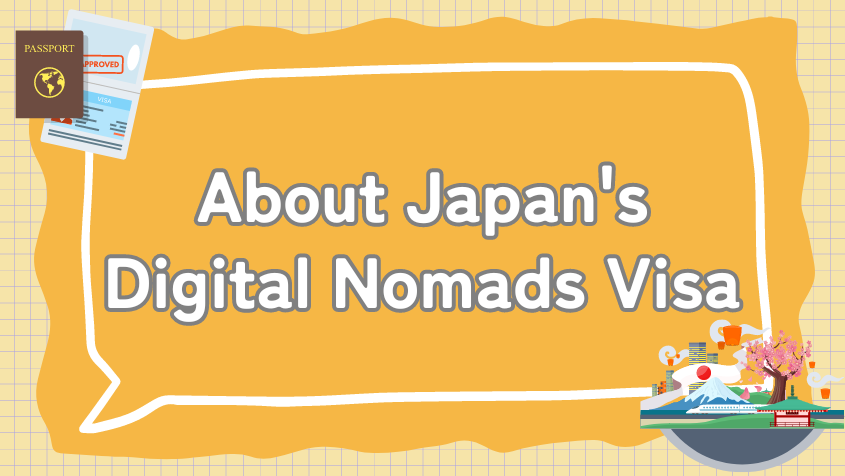
In Japan, the Digital Nomad Visa system was introduced starting from April 1, 2024.
This system is a new visa program aimed at allowing remote workers, freelancers, and entrepreneurs to reside in Japan while engaging in remote work activities.
Here, We will explain the key points about Japan’s Digital Nomad Visa.
For detailed information, please refer to the「Status of Residence of “Designated Activities” (for Digital Nomad / Spouse or child of Digital Nomad)」section on the Immigration Services Agency of Japan’s website.
Visa Overview
The Digital Nomad Visa introduced in Japan starting from April 1, 2024, enables foreign digital nomads to reside in Japan while engaging in remote work.
This visa is aimed at individuals who primarily work for clients or employers outside of Japan, eliminating the requirement for direct employment contracts within Japan.
The visa is intended for individuals such as remote workers who utilize IT, freelancers, and entrepreneurs.
Visa Issuance Requirements
- Employees, freelancers, or business owners working remotely for a company registered outside Japan (foreign companies, etc.).
- Holders of passports from countries that have visa exemption arrangements and double taxation prevention agreements with Japan.
- Individuals with an annual income of at least 10 million yen.
- Must have medical insurance coverage, such as overseas travel accident insurance, for death, injury, and illness during the planned stay in Japan.
Eligible countries and regions
Please refer to the PDF document listing Eligible countries and regiaons for degital nomad visa(PDF) for Japan’s digital nomad visa, as published by Japan’s Immigration Services Agency.
Term of stay
You can stay in Japan for a maximum of 6 months under this visa (non-renewable). After leaving the country, you can return and stay again under this status after 6 months.
※You will not be eligible for a residence card under this visa category.
Summary
Living as a digital nomad in Japan offers numerous advantages, including rich cultural experiences, advanced infrastructure, and a comfortable remote work environment.
With options like Serviced Apartments and shared houses available, there are diverse housing options that can enhance your quality of life.
However, there are also challenges such as language barriers, high cost of living, and visa regulations.
Understanding these issues beforehand and taking appropriate measures can help make your digital nomad life in Japan more fulfilling.
In Japan, the pioneer「Extended Stay Finder」 which first proposed Serviced Apartments, supports finding the optimal housing tailored to customer needs from long-term to short-term stays, utilizing abundant information and a unique network.
If you’re looking for the perfect housing for digital nomads in Japan, please feel free to consult “Extended Stay Finder”.






